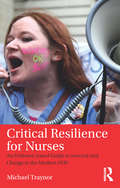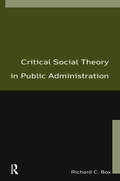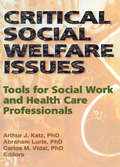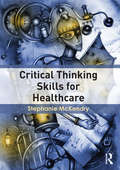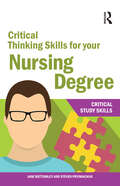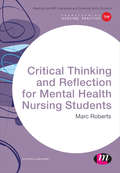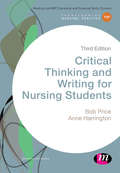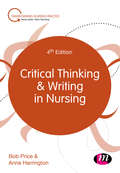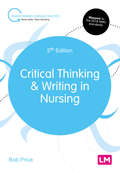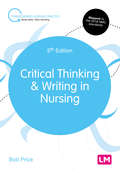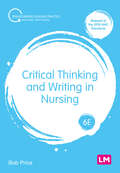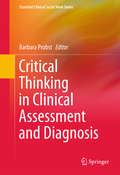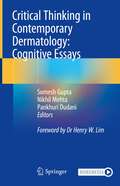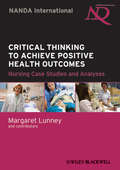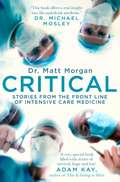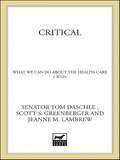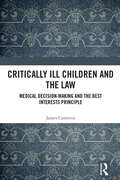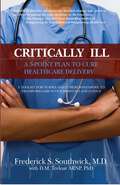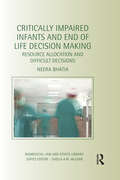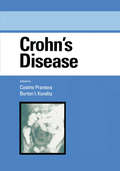- Table View
- List View
Critical Resilience for Nurses: An Evidence-Based Guide to Survival and Change in the Modern NHS
by Michael TraynorThe nursing profession is under pressure. Financial demands, student debt, the target culture, political scrutiny in the wake of major care scandals and increasing workloads are all taking their toll on professional morale and performance. This timely book considers the meaning of resilience in this adverse context and explains why measures to preserve individual nurses’ and students’ well-being are flawed if they don’t take into account wider political and organizational perspectives. Arguing that healthcare can be thought about and experienced differently, this book: provides a summary of the latest research on resilience, explaining its relevance and also limitations for nurses; considers debates about compassion and highlights the effects of policy agendas on nurse education and nursing work; re-evaluates nursing’s professional identity, including where nursing has come from and the effects of class, gender and race on its powerbase; assesses the role of politics and social media, both in driving change and feeding resistance; and introduces the idea of critical resilience as a complete framework for resisting bullying and fostering survival and change in the nursing workforce. Direct, upbeat, at times provocative and witty, this agenda-setting book enables nurses to understand why they feel the way they do. It also lists what opportunities are available to them to change, resist and survive in what has become a complex, challenging – if still deeply rewarding – line of work.
Critical Social Theory in Public Administration
by Richard C BoxThe essential premise of critical social theory is that contemporary society is neither democratic nor free, but that modern global capitalism creates a citizenry satiated with consumer goods, unaware of alternative ways of living. In the public sector, critical theory suggests that governing systems are influenced, if not controlled, by the wealthy and powerful, leaving public professionals to decide whether to serve those interests or the interests of a broader public. This book provides a framework for the application of critical social theory in public administration. Its goal is to encourage awareness among public administration scholars and practitioners of social conditions that tend to shape and constrain scholarship, practice, teaching, and social change. At a time when concern for public interest and a civil society have largely been displaced by the goals of economic efficiency and the "New Public Management," Critical Social Theory in Public Administration presents a viable alternative that incorporates the latest views of postmodern thinking with the central elements of critical social theory.
Critical Social Welfare Issues: Tools for Social Work and Health Care Professionals
by Arthur J. Katz Abraham Lurie Carlos VidalCritical Social Welfare Issues is a collection of lectures by noted social welfare experts that addresses paramount issues facing society and suggests recommendations for positive change. It is a useful handbook for social workers, psychologists, educators, health professionals, and human service administrators and a valuable text for students studying social welfare policy and social work in health care.The result of the Distinguished Lecturers Series instituted at the State University of New York at Stony Brook, Critical Social Welfare Issues brings nationally recognized and outstanding social work and allied health care scholars and practitioners together for their views on topics such as: welfare reform and homelessness in the U.S. crisis in child welfare and women as victims the changing structure of African-American families the growing Hispanic population and the unique challenges they face mandatory vs. voluntary HIV testing for newborns the infrastructure of the social work profession the for-profit market system for social work and health care the future for health care professionals de-professionalization in health care professionals and the political processAs the Editors explain, Critical Social Welfare Issues addresses “the rapidly changing context in the various fields of practice of professional social work and other health care areas. The crises that are identified are newly emerging and part of a long historical process which has been exacerbated by current political and economic changes and events. . . . The threat currently seems to be coming not only from governmental political forces focused to tax reductions and right wing ideologies but for the first time from the non-government sector, the for-profit market system which is projecting huge profits from health care, education, and corrections among other social welfare arenas.”
Critical Thinking Skills for Healthcare
by Stephanie McKendryThinking critically is an essential skill, both for students and for the modern, evidence-based, healthcare practitioner. You need to be able to find, understand and evaluate the evidence that underpins your assignments, clinical decision making and practice. The good news is that you use all of these skills in everyday life. You don’t believe every advert you see or respond to every spam email. It’s just a question of taking these critical skills and having the confidence to apply them to your academic work. This book will help you do just that. It will enable you to: - recognise your existing ability to be a critical thinker - spot logical flaws and inconsistencies in arguments - consider health issues from multiple perspectives, weighing up the strengths and weaknesses of a case - build a convincing argument in assessments - develop a range of critical skills for successful study and healthcare practice. Critical Thinking Skills for Healthcare is an essential resource for all health professionals in training.
Critical Thinking Skills for your Nursing Degree (Critical Study Skills)
by Jane Bottomley Steven PryjmachukIf you are embarking on a university nursing or midwifery degree, the books in this series will help you acquire and develop the knowledge, skills and strategies you need to achieve your goals. They provide support in all areas important for university study, including institutional and disciplinary policy and practice, self-management, and research and communication. Tasks and activities are designed to foster aspects of learning which are valued in higher education, including learner autonomy and critical thinking, and to guide you towards reflective practice in your study and work life.
Critical Thinking and Reflection for Mental Health Nursing Students (Transforming Nursing Practice Series)
by Marc RobertsThe ability to reflect critically is a vital nursing skill. It will help your students to make better decisions, avoid errors, identify good and bad forms of practice and become better at learning from their experiences. The challenges they will face as a mental health nurse are complex so this book breaks things down to the foundations helping them to build critical thinking and reflection skills from the ground up. Key features: · Covers the theory and principles behind critical thinking and reflection · Explores the specific mental health context and unique challenges students are likely to face as a mental health nurse · Applies critical thinking to practice but also to academic study, showing how to demonstrate these skills in assignments
Critical Thinking and Reflection for Mental Health Nursing Students (Transforming Nursing Practice)
by Marc RobertsThe ability to reflect critically is a vital nursing skill. It will help your students to make better decisions, avoid errors, identify good and bad forms of practice and become better at learning from their experiences. The challenges they will face as a mental health nurse are complex so this book breaks things down to the foundations helping them to build critical thinking and reflection skills from the ground up. Key features: · Covers the theory and principles behind critical thinking and reflection · Explores the specific mental health context and unique challenges students are likely to face as a mental health nurse · Applies critical thinking to practice but also to academic study, showing how to demonstrate these skills in assignments
Critical Thinking and Writing for Nursing Students
by Anne Harrington Bob PriceCritical thinking, writing and reflection are core skills that nursing students are expected to develop throughout their studies. This book is a clear and practical guide to help students develop these skills. It explains what critical thinking is and how students should use it throughout their nursing programme. Throughout, the book demonstrates the transferable nature of critical thinking and reflection from academic contexts to the real practice of nursing. The 2nd edition includes a new chapter on critiquing literature, examines how caring skills are essential to critical thinking and includes a website with annotated examples of students' work.
Critical Thinking and Writing for Nursing Students (Transforming Nursing Practice)
by Bob Price Dr Anne HarringtonCritical thinking, writing and reflection are core skills that nursing students are expected to develop throughout their studies. This book is a clear and practical guide to help students develop these skills. It explains what critical thinking is and how students should use it throughout their nursing programme. Throughout, the book demonstrates the transferable nature of critical thinking and reflection from academic contexts to the real practice of nursing. The 2nd edition includes a new chapter on critiquing literature, examines how caring skills are essential to critical thinking and includes a website with annotated examples of students' work.
Critical Thinking and Writing in Nursing (Transforming Nursing Practice Series)
by Bob Price Dr Anne HarringtonThis book is a clear and practical guide to help students develop critical thinking, writing and reflection skills. It explains what critical thinking is and how students should use it throughout their nursing programme. This new edition also provides content on the reflective practice requirements for revalidation and is mapped to the new 2018 NMC standards. This text provides an innovative new framework that helps students appreciate different levels of critical thinking and reflection required of degree level study. The book demonstrates the transferable nature of critical thinking and reflection from academic contexts to the real practice of nursing. Key features: Clear and straightforward introduction to critical thinking directly written for nursing students, with chapters relating the subject to specific study and practice contexts Student examples and scenarios throughout, including running case studies from four nursing students Each chapter is linked to the new NMC standards of proficiency for registered nurses
Critical Thinking and Writing in Nursing (Transforming Nursing Practice Series)
by Bob Price Dr Anne HarringtonThis book is a clear and practical guide to help students develop critical thinking, writing and reflection skills. It explains what critical thinking is and how students should use it throughout their nursing programme. This new edition also provides content on the reflective practice requirements for revalidation and is mapped to the new 2018 NMC standards. This text provides an innovative new framework that helps students appreciate different levels of critical thinking and reflection required of degree level study. The book demonstrates the transferable nature of critical thinking and reflection from academic contexts to the real practice of nursing. Key features: Clear and straightforward introduction to critical thinking directly written for nursing students, with chapters relating the subject to specific study and practice contexts Student examples and scenarios throughout, including running case studies from four nursing students Each chapter is linked to the new NMC standards of proficiency for registered nurses
Critical Thinking and Writing in Nursing (Transforming Nursing Practice Series)
by Bob PriceCritical thinking and writing is central to effective nursing practice. Written specifically for nursing students, this book offers practical guidance on what it means to think critically as a nurse and how to apply this to study and practice. From critically reviewing literature for assessments to evaluating evidence to support decision-making in practice, the book provides a unique framework for developing essential critical skills. Key features A new chapter on ′Writing the Clinical Case Study′, along with new guidance on how to become a successful independent learner, advice on managing information overload, and many more updates and enhancements on the previous edition. Each chapter is mapped to the 2018 NMC standards Filled with activities and student case studies demonstrating how to apply critical thinking and reflection in practice Innovative approach that introduces the different levels of critical thinking and reflection required of degree level study
Critical Thinking and Writing in Nursing (Transforming Nursing Practice Series)
by Bob PriceCritical thinking and writing is central to effective nursing practice. Written specifically for nursing students, this book offers practical guidance on what it means to think critically as a nurse and how to apply this to study and practice. From critically reviewing literature for assessments to evaluating evidence to support decision-making in practice, the book provides a unique framework for developing essential critical skills. Key features A new chapter on ′Writing the Clinical Case Study′, along with new guidance on how to become a successful independent learner, advice on managing information overload, and many more updates and enhancements on the previous edition. Each chapter is mapped to the 2018 NMC standards Filled with activities and student case studies demonstrating how to apply critical thinking and reflection in practice Innovative approach that introduces the different levels of critical thinking and reflection required of degree level study
Critical Thinking and Writing in Nursing (Transforming Nursing Practice Series)
by Bob PriceCritical thinking and writing is central to effective nursing practice. Written specifically for nursing students, this book offers practical guidance on what it means to think critically as a nurse and how to apply this to study and practice. From critically reviewing literature for assessments to evaluating evidence to support decision-making in practice, the book provides a unique framework for developing essential critical skills. Key features • Each chapter is mapped to the 2018 NMC standards • Includes new guidance on developing resilience, reflective essays and practice templates and portfolios • Filled with activities and student case studies demonstrating how to apply critical thinking and reflection in practice • Innovative approach that introduces the different levels of critical thinking and reflection required of degree level study
Critical Thinking and Writing in Nursing (Transforming Nursing Practice Series)
by Bob PriceCritical thinking and writing is central to effective nursing practice. Written specifically for nursing students, this book offers practical guidance on what it means to think critically as a nurse and how to apply this to study and practice. From critically reviewing literature for assessments to evaluating evidence to support decision-making in practice, the book provides a unique framework for developing essential critical skills. Key features • Each chapter is mapped to the 2018 NMC standards • Includes new guidance on developing resilience, reflective essays and practice templates and portfolios • Filled with activities and student case studies demonstrating how to apply critical thinking and reflection in practice • Innovative approach that introduces the different levels of critical thinking and reflection required of degree level study
Critical Thinking in Clinical Assessment and Diagnosis (Essential Clinical Social Work Series)
by Barbara Probst"This much-needed volume brings to the clinician or student some of the best critical-minded analysis by some of the most insightful thinkers about psychiatric diagnosis today. The thought-provoking questions these essays raise, and the multifaceted and provocative answers they provide, cultivate sensitivity to the nuances of diagnostic assessment that often makes the difference between clinical success and failure. " - Jerome C. Wakefield, PhD, DSW, New York University Silver School of Social Work, New York This transformative resource challenges social workers and mental health professionals to rethink their approaches to assessment and diagnosis from the ground up. Among the book's unique features are its use of diverse lenses to examine a common case and its illustration of how multiple perspectives can be integrated for a richly textured portrait of the individual in context. Equally crucial is the book's commitment to professional development, from exercises to improve case conceptualization to strategies for teaching and learning. Topics include: The DSM-5 definition of mental disorder: critique and alternatives. Making assessment decisions: macro, mezzo, and micro perspectives. Neuroscience, resilience, and the embodiment of "mental" disorder. Narrative, psychodynamic, and cultural conceptualizations of disorder. Person-centered and contextualized diagnosis in mental health. Meeting the challenge of teaching integrated assessment. Critical Thinking in Clinical Assessment and Diagnosis has much to offer professionals, researchers, and educators in the fields of social work and mental health. .
Critical Thinking in Contemporary Dermatology: Cognitive Essays
by Somesh Gupta Nikhil Mehta Pankhuri DudaniThis book covers contemporary essays by opinion leaders on crucial topics in dermatology that are not readily available in other textbooks and journals. The essays are written in an unconventional style compared to other textbook styles. Each chapter is authored by a globally renowned expert in that field.The book focuses on artificial intelligence in dermatology, placebo and nocebo in dermatology, mind and skin diseases, unconventional/holistic views on skin aging, evidence-informed dermatology, procedural dermatology, investigative dermatology, lasers and light sources in dermatology, skin in rheumatologic diseases, immunology of the skin, live imaging techniques in dermatology, and so on. The book will help specialists look at the subject from an entirely different perspective and understand how dermatology is evolving in the 21st century. A wide range of dermatology topics is covered, providing a snapshot of contemporary dermatology and the dermatology of the future. It promises to be a delightful journey from basic science to translational science to clinical science. This book will be Intellectually stimulating for dermatology trainees, practitioners, and academicians.
Critical Thinking to Achieve Positive Health Outcomes
by Margaret LunneyThis book uses the latest research findings to apply critical thinking processes for the development of diagnostic reasoning and the selection of patient outcomes and nursing interventions.Four chapters describe the meaning of intelligence, critical thinking, and application of critical thinking processes within nursing. The case studies and their ultimate resolution to intervention and outcome illustrate these processes by enabling repeated practice. Case studies are organized into four sections; problem diagnoses, risk diagnoses, health promotion diagnoses, and strength diagnoses. A companion website provides on-line resources.
Critical To Care
by Pat Armstrong Hugh Armstrong Krista Scott-DixonWho counts as a health care worker? The question of where we draw the line between health care workers and non-health care workers is not merely a matter of academic nicety or a debate without consequences for care. It is a central issue for policy development because the definition often results in a division among workers in ways that undermine care.Critical to Care uses a wide range of evidence to reveal the contributions that those who provide personal care, who cook, clean, keep records, and do laundry make to health services. As a result of current reforms, these workers are increasingly treated as peripheral even though the research on what determines health demonstrates that their work is essential. The authors stress the invisibility and undervaluing of 'women's work' as well as the importance of context in understanding how this work is defined and treated.Through a gendered analysis, Critical to Care establishes a basis for discussing research, policy, and other actions in relation to the work of thousands of marginalized women and men every day.
Critical: Stories from the front line of intensive care medicine
by Dr Matt MorganJourney into the world of intensive care medicine and the lives of people who have forever been changed by it. &‘A very special book filled with stories of survival, hope and loss.&’Adam Kay '[Morgan's] wit and compassion are everywhere evident in this enlightening book, and he makes a welcome contribution to our understanding of these extraordinary times.'Sunday Times There is no room for error in the ICU. Full focus is required at all times. It can be the difference between life and death. Through the remarkable stories of his patients, Dr. Matt Morgan guides you through the body and its organs. He explains how various critical conditions arise, and all that goes into treating them – from the science, research and technology, to the tireless efforts of the doctors and nurses. This book gives you powerful insights about intensive care, many of which may prevent you, or those close to you, from ending up there. It will even teach you how to save a life. Movingly and compassionately, Matt writes about the cases and the people that have stayed with him, both the recoveries and the losses. This book shows the fragility of life, but also the incredible resilience of the human body and spirit. Sometimes darkness can show you the light.
Critical: What We Can Do About the Health-Care Crisis
by Tom Daschle Scott S. Greenberger Jeanne M. LambrewA much-needed and hard-hitting plan, from one of the great Democratic minds of our time, to reform America's broken health-care system. Undoubtedly, the biggest domestic policy issue in the coming years will be America's health-care system. Millions of Americans go without medical care because they can't afford it, and many others are mired in debt because they can't pay their medical bills. It's hard to think of another public policy problem that has lingered unaddressed for so long. Why have we failed to solve a problem that is such a high priority for so many citizens? Former Senate Majority Leader Tom Daschle believes the problem is rooted in the complexity of the health-care issue and the power of the interest groups—doctors, hospitals, insurers, drug companies, researchers, patient advocates—that have a direct stake in it. Rather than simply pointing out the major flaws and placing blame, Daschle offers key solutions and creates a blueprint for solving the crisis. Daschle's solution lies in the Federal Reserve Board, which has overseen the equally complicated financial system with great success. A Fed-like health board would offer a public framework within which a private health-care system can operate more effectively and efficiently—insulated from political pressure yet accountable to elected officials and the American people. Daschle argues that this independent board would create a single standard of care and exert tremendous influence on every other provider and payer, even those in the private sector. After decades of failed incremental measures, the American health-care system remains fundamentally broken and requires a comprehensive fix. With his bold and forward-looking plan, Daschle points us to the solution.
Critically Ill Children and the Law: Medical Decision-Making and the Best Interests Principle
by James CameronA series of recent high-profile court cases has demonstrated the inadequacy of current laws in addressing issues relating to medical treatment decisions involving seriously ill children. The challenges of determining that life-sustaining medical treatment is not in a young child’s best interests have resulted in criticism of the best interests principle. This book explores the theoretical foundations of the best interests principle, and alternatives offered in the academic literature, to allow readers to understand why the principle remains contentious despite its prevalence. It provides theoretical background, exploration of what occurs in practice, and proposes a novel approach to address these challenges. Frameworks for decision-making identified in the academic literature are used to examine the application of the best interests principle in practice in England and Wales, Australia, and New Zealand through a review of the case law and qualitative research with paediatric doctors. The exploration of current practice allows readers to understand the challenges of applying the best interests principle, but also the need to retain a focus on the child. Readers are introduced to a human-rights based approach, which ensures that the focus remains on upholding the child’s best interests but also provides a more comprehensive explanation of the situation. Progressing the debate around end-of-life decision-making and children, the book will be a valuable resource for academics, researchers and policy-makers. It will also provide practical guidance to both legal and medical practitioners in managing disputes about the provision of life-sustaining treatment.
Critically Ill: A 5-Point Plan to Cure Healthcare Delivery
by Frederick S. SouthwickTwo decades ago Dr. Fred Southwick witnessed the near demise of his wife while she was being cared for in a prominent academic medical center. For 15 years he blamed the individual physicians who cared for Mary. However five years ago the doctor realized that encouraging individual physicians to try harder was not the solution.As he started searching for answers, Dr. Southwick learned that the outdated model of medical care in our country results in fragmented care, great inefficiency, and 44,000–95,000 annual deaths due to preventable medical errors. Despite calls to action by the Institute of Medicine and many patient safety organizations, these statistics have persisted for over a decade.In Critically Ill, Mary’s dramatic healthcare nightmare is used as a learning tool to reveal startling, dangerous flaws in our current system of medical care and present a detailed five point action plan to cure healthcare delivery and bring about change.
Critically Impaired Infants and End of Life Decision Making: Resource Allocation and Difficult Decisions (Biomedical Law and Ethics Library)
by Neera BhatiaDecisions to withdraw or withhold life-sustaining treatment are contentious, and offer difficult moral dilemmas to both medical practitioners and the judiciary. This issue is exacerbated when the patient is unable to exercise autonomy and is entirely dependent on the will of others. This book focuses on the legal and ethical complexities surrounding end of life decisions for critically impaired and extremely premature infants. Neera Bhatia explores decisions to withdraw or withhold life-sustaining treatment from critically impaired infants and addresses the controversial question, which lives are too expensive to treat? Bringing to bear such key issues as clinical guidance, public awareness, and resource allocation, the book provides a rational approach to end of life decision making, where decisions to withdraw or withhold treatment may trump other competing interests. The book will be of great interest and use to scholars and students of bioethics, medical law, and medical practitioners.
Crohn's Disease (Gastroenterology and Hepatology)
by Cosimo Prantera Burton I. Korelitz"Congratulations to Drs. Korelitz and Pranteraa state-of-the-art publication devoted to Crohn's disease with special focus on etiopathogenesis, diagnostic evaluation, and therapeutic management provides an up-to-date all-inclusive resourcehighly recommend[ed] a worthwhile purchase and deserves a place in your library."--Gastroenterology. "The book
